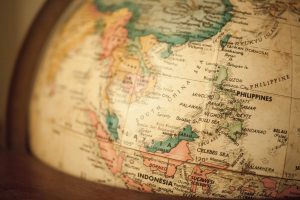The Philippine government has accused the China Coast Guard (CCG) of “elevating the tension” in the South China Sea, two days after an incident in which Chinese patrol boats damaged Philippine vessels with high-pressure water cannons.
Commodore Jay Tarriela, the spokesperson for the Philippine Coast Guard (PCG), said that the use of the cannons, while falling short of an “armed attack” under international law, was an instance of “brute force.”
“It just goes to show that Goliath is becoming more Goliath,” Tarriela told a briefing, according to a Reuters report. “They don’t hesitate to use brute force to violate international law.”
Tarriela’s comments came after an incident on April 30, in which Chinese vessels fired water cannons at the PCG vessel BRP Bagacay and BRP Bankaw, a fisheries patrol boat, which were carrying out what the Philippine authorities described as “a legitimate maritime patrol” in the vicinity of Scarborough Shoal. The incident damaged part of the PCG vessel’s deck railing and canopy, and damaged the latter boat’s electrical, navigation, and radio systems.
As Jonathan Head of the BBC, who was aboard the BRP Bagacay at the time of the attack, reported, “we could hear the jets of water thundering against the metal walls of the ship. They smashed the awning in the stern, and mangled a railing on one side.”
In yesterday’s briefing, Tarriela accused the CCG of increasing the pressure of its water cannons, to the point where they were causing significant damage to Manila’s ships.
“This is the first time… that the coast guard vessel has been subject to a direct water cannon with that kind of pressure that even resulted in structural damage,” Tarriela said, according to Rappler. He alleged that the water pressure was strong enough to bend the metal railings of the BRP Bankaw.
Several foreign nations, including the United States, France, New Zealand, and the European Union, duly condemned the Chinese action, with many of them calling on China to abide by the terms of the 2016 arbitral award that found most of Beijing’s claims to the South China Sea invalid under international law. China has rejected the ruling.
Scarborough Shoal, known to Manila as Baja de Masinloc, lies well within the Philippines’ EEZ around 198 kilometers west of the island of Luzon. The tiny coral shoal, which lies close to important international shipping lanes, fell under China’s effective control after a 10-week stand-off with the Philippines in 2012, and the CCG has maintained a constant presence there ever since.
The shoal is one of several locations in the South China Sea that have seen confrontations between the Chinese and Philippine coast guards, as the administration of President Ferdinand Marcos Jr. has ordered the PCG to hold the line against more aggressive Chinese actions. The other major flashpoint has been Second Thomas Shoal in the Spratly Islands, a submerged shoal some 630 kilometers to the south, where the Philippines maintains an outpost in a grounded World War II-era warship. On numerous occasions, Chinese vessels have rammed and fired water cannons at PCG patrol boats and supply vessels, in a bid to prevent them from resupplying the Philippine marines stationed on the shoal.
Tarriela’s comment is the latest salvo in the rhetorical battle that has broken out between Beijing and Manila in parallel with the growing tensions. Like past Philippine denunciations, the comments are unlikely to deter China from its chosen course. Indeed, the fact that the Philippines has undertaken a policy of publicizing and denouncing the Chinese actions, and strengthening its ties with partners and allies, suggests that it is no longer putting much in the prospect of a diplomatic solution, even if talks are proceeding quietly in the background.
Throughout the recent standoffs, China has been coldly dismissive of the Philippines’ concerns, and accused its partners, including its American security ally, of inflaming the maritime and territorial disputes. A Chinese embassy spokesperson said the shoal “has always been China’s territory” and urged the Philippines to “stop making infringement and provocations at once and not to challenge China’s resolve to defend our sovereignty.”

































